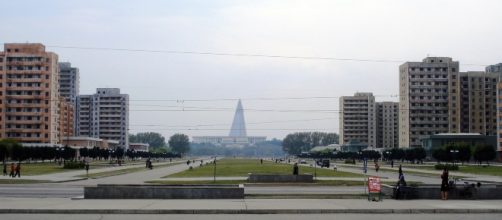According to the Japanese TV station NHK, the missile left a locality near Sunan, crossed the sky of Japan, then broke into three pieces and fell into the Pacific Ocean.
Japanese Prime Minister, Shinzo Abe, called an emergency meeting to discuss the launch. The purpose of the meeting was to "do the utmost to firmly protect people's lives", according to Abe.
Japan's Secretary-General, Yoshihide Suga, said the proximity of the missile posed an unprecedented threat and condemned the launch in all its plenitude.
South Korean President Moon Jae-in also convened a meeting on the subject.
The Pentagon issued a statement in which it confirms the launch of a missile that flew over Japan and claims that it did not pose any danger to the United States.
Last Saturday (26), North Korea fired three short-range ballistic missiles, also towards the Sea Of Japan. According to the US Pacific Command, the launch of the first and third failed, while the second seems to have exploded almost immediately after launch.
Compliment
Just over ten days ago, President Donald Trump praised North Korean leader Kim Jong-un for his "wise attitude" by ruling out the possibility of an attack. The day before, Jong-un had said he would continue to observe American attitudes, rather than determine an immediate attack.
On Aug. 15, US Secretary of State Rex Tillerson said he was "pleased to see that the Pyongyang regime had shown some restraint we have not seen in the past" and even expressed hope for a future dialogue.
Optimism was shared by Trump, who said he respected the fact that "he (Jong-un) is starting to respect us." According to Trump, "maybe - probably not, but maybe - something positive might come out of it."
A day later, however, the North Korean state agency (KCNA) reported the production of more solid rocket engines and missile warheads.
In addition, diplomat Ju Yong Chol told the UN that his country's nuclear arsenal will never enter the negotiating table.
"The measures taken by North Korea to strengthen its nuclear defense capabilities and develop intercontinental rockets are justifiable and a legitimate option for self-defense in the face of apparent and real threats," Ju said in Geneva, referring to the "constant nuclear threats" from the United States.
"As long as US hostile policy and nuclear threats are not discussed, North Korea will never put its nuclear defense force on the negotiating table."
South Korea holds live-fire drills that simulate destroying North Korea's leadership https://t.co/BOqvNGQSqB pic.twitter.com/bMNfjWYbj8
— CNN (@CNN) August 29, 2017
Crisis with the US
The crisis between North Korea and the United States worsened in early August when Pyongyang announced that it intended to launch four medium-range Hwasong-12 missiles in an attack near the island of Guam, the territory of the United States in the Pacific Ocean.
In response, Trump promised to respond "with fire and fury as the world has never seen" if the Asian country insisted on threats.
In response, Gen. Kim Rak Gyom, commander of the Korean People's Army's Strategic Forces, said the American president had not understood. "Healthy dialogue is not possible with a subject so devoid of reason and only absolute force works", said the Korean commander.
The tone of the discussion went up, with Trump claiming that his threat to respond with "fire and fury" might not have been "strong enough."
In turn, the North Korean military has vowed to "destroy without mercy the provocateurs who are making desperate attempts to stifle North Korea" and said that the United States would "suffer a shameful defeat and a final condemnation" if "they persist with their military actions, sanctions, and pressures."
Tensions seemed to have been curtailed after Kim Jong-un announced that he would not immediately authorize the launch but would rather continue to observe US behavior and actions.
In a message on Twitter, Trump reacted as follows: "Kim Jong-Un made a very wise and well-informed decision. The alternative would have been catastrophic and unacceptable!"


